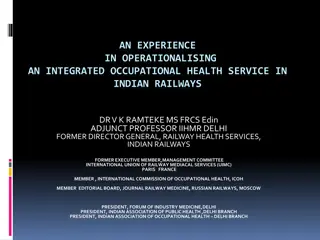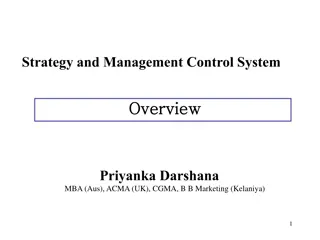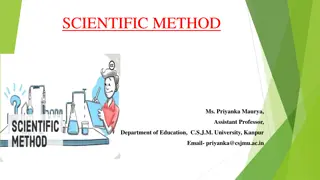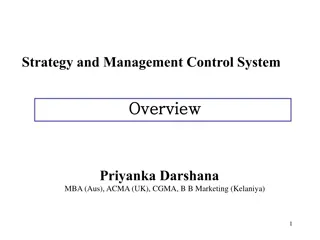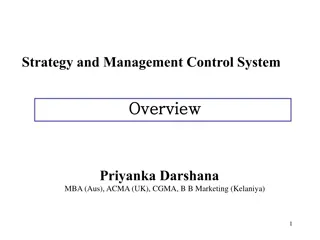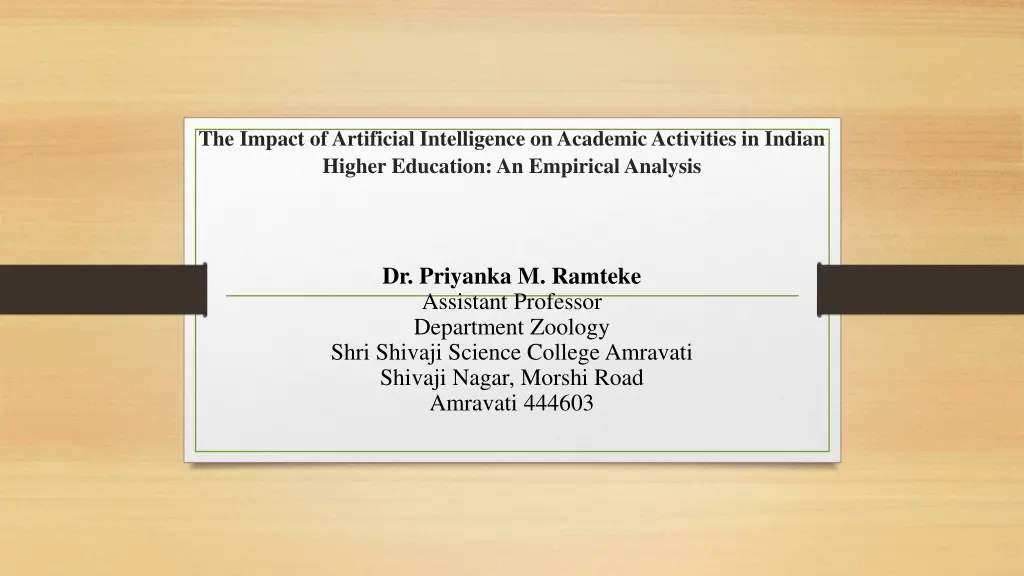
Transforming Higher Education in India: The Impact of Artificial Intelligence
Explore the empirical analysis of AI's role in Indian higher education, focusing on personalized learning, automated grading, and administrative tasks. Understand historical context, challenges, opportunities, and the aim of research on AI in academia. Learn about research objectives, methodology, and ethical considerations to evaluate AI adoption, student engagement, workforce readiness, and ethical concerns. Gain insights into the transformative effects of AI on higher education in India.
Download Presentation

Please find below an Image/Link to download the presentation.
The content on the website is provided AS IS for your information and personal use only. It may not be sold, licensed, or shared on other websites without obtaining consent from the author. If you encounter any issues during the download, it is possible that the publisher has removed the file from their server.
You are allowed to download the files provided on this website for personal or commercial use, subject to the condition that they are used lawfully. All files are the property of their respective owners.
The content on the website is provided AS IS for your information and personal use only. It may not be sold, licensed, or shared on other websites without obtaining consent from the author.
E N D
Presentation Transcript
The Impact of Artificial Intelligence on Academic Activities in Indian Higher Education: An Empirical Analysis Dr. Priyanka M. Ramteke Assistant Professor Department Zoology Shri Shivaji Science College Amravati Shivaji Nagar, Morshi Road Amravati 444603
Key Points: Objective: Examine AI's role in transforming Indian higher education by surveying colleges and universities. Scope: Adoption of AI-based programs from students' perspectives. Impact on diverse fields, levels, and demographics. Focus Areas: Personalized Learning: Adaptive learning tailored to individual needs. Automated Grading: Efficiency in assessments. Intelligent Tutoring Systems: Enhanced learning support. Administrative Tasks: Streamlining admissions, resource management. Significance: Insights for policymakers and stakeholders. Prepare students for an AI-driven workforce.
Historical Context & Challenges Title:Opportunities and Challenges of AI Integration in Education Key Points: Historical Context: AI's potential to revolutionize teaching with dynamic, tailored learning experiences. Importance of equipping students with AI competencies for global competitiveness. Opportunities: Bridging educational disparities with personalized learning. Automating administrative tasks to enhance teaching focus. Challenges: Ensuring data privacy and transparency. Maintaining algorithmic fairness. Balancing technology use with human interaction. Goal: Foster responsible AI use in education to develop 21st-century skills and drive innovation in India s education system.
Aim of the Research Title:Impact of AI on Indian Higher Education Key Points: Purpose: Evaluate AI's influence on: Student engagement. Academic performance. Workforce readiness. Outcome: Provide insights for educational institutions and policymakers to understand AI s transformative role in higher educationObjectives of the Study Title:Research Objectives Key Points: 1.Assess AI adoption in Indian higher education. 2.Examine AI-powered personalized learning s impact on student engagement. 3.Evaluate students preparedness with AI-related skills for future job markets. 4.Investigate ethical concerns like data privacy and algorithmic biases. 5.Analyze AI s influence on academic processes. 6.Understand AI s broader effects on India s higher education system.
Research Methodology Data Collection Tool: Google Forms Benefits: Easy distribution and data organization Approach: Online survey targeting diverse participants Sample Size 150 Indian university students Focus: Representation of AI s integration in higher education Tools Google Forms for data collection, storage, and visualization Ethical Considerations Transparency: Inform participants about purpose and data usage Voluntary participation with withdrawal option Confidentiality measures Scope of the Study Objective Exploring the transformative impact of AI on higher education in India Analysis across disciplines and cities Focus Areas Extent of AI integration in curricula Applications in learning and administration Implications for students educational experiences Perspective Emphasis on evolving trends without definitive conclusions
Development & Diversity in Indian Higher Education Significance Critical role in socio-economic development Tradition of academic excellence AI Integration Incorporation into curricula and frameworks Enhanced learning through AI-driven analysis and processes Challenges Addressed Streamlining processes and tackling key educational challenges AI in Teaching & Learning Personalized Learning Adaptive platforms Intelligent tutoring systems Boosting engagement and retention Enhanced Feedback Mechanisms Data analytics-driven tools Real-time, individualized feedback
AI in Administrative Processes Key Applications Admissions Management: Automating applications and enrollment Resource Allocation: Efficient use of resources Attendance Tracking: Improved accountability and time management Impact Educators focus on core responsibilities Preparing Students for AI-Driven Job Markets Key Focus Areas Skill Development: Critical thinking, data analysis, problem-solving Industry Collaboration: Partnerships with tech leaders for hands-on experiences Outcome Equipping students with in-demand competencies for a competitive edge Global & National Trends in AI Integration Global Trends Learning management systems MOOCs and virtual labs AI-based assistants for guidance and support India s Progress Significant investments Revolutionizing education through AI
Data Collection and Findings What is your gender? 150 responses 2 5 44.00% 49.3 male female other not to say
What is your age? 150 responses 10 21.3 under 18 18-24 25-34 33.3 35-44 35.3 Fig.2
What is the academic discipline? 150 responses 14 16 66.7 24 25.3 20 (Fig.3) Engineering Science Arts and Humanities Buisness and Management Social Sciences Other
Are you familiar with the use of AI in your college education? 150 responses 54.70% 40.70% Very familiar somewhat familiar 54.6 Not familiar at all (Fig.4)
Which AI Tools or Technologies have you encounter in your college education? 150 responses 19.3 30.7 25.7 24 AI driven learning platforms AI powered chatbots or virtual assistants AI based personalized course AI based personalized course recommendation for their college education.19.3% p Fig. 5)
How often do you use AI- driven learning tools or platform in your studies? 150 responses 18 35.3 46.7 frequently occasionaly Rarely Never (Fig. 6)
In your opinion, has the use of AI in education positively impacted your academic performance? 150 responses 9 13.3 40 39.3 stronly Agree Agree Netral Disgree stronly Disagree Fig. 7
How do you perceive AIs impact on your level of engagement in college courses? 150 responses 44.70% 14 41.3 AI enhance my engagement AI has no noticeable effect on my engagement AI diminishes my engagement Fig. 8
Do you find AI -based recommendations for personalized learning helpful? 150 responses 7 50.7 42.6 very helpful somewhat helpful not helpful (Fig.9)
What aspect of AI driven education do you find most valuable? 150 responses 30.7 31.3 13.3 21.3 personalized learning experience s AI driven education are Instant support through chatbots or virtual assistants enhanced access to course material. Improve academic performance other (Fig. 10)
Conclusion Transformative Impact of AI: AI is revolutionizing India's higher education by personalizing learning, streamlining administrative tasks, and enhancing accessibility. High Awareness and Adoption: Over 90% of students recognize AI's role in improving academic performance and engagement. Key Benefits: Widespread use of AI-driven platforms, chatbots, and personalized course recommendations. Enhanced learning experiences and academic outcomes. Preparation for AI-driven job markets through curriculum updates. Challenges: Ethical concerns: data privacy, algorithmic biases, and transparency. Limited engagement for some students, calling for better design and implementation. Conclusion: AI has immense potential to transform education in India. A balanced approach emphasizing innovation and ethics can maximize its benefits, prepare students for the future, and bridge educational disparities.
1. Alam, A. (2020). Possibilities and challenges of compounding artificial intelligence in Indias educational landscape. Alam, A.(2020). Possibilities and Challenges of Compounding Artificial Intelligence in India s Educational Landscape. International Journal of Advanced Science and Technology, 29(5), 5077-5094. 2. Almaiah, M. A., Alfaisal, R., Salloum, S. A., Hajjej, F., Thabit, S., El-Qirem, F. A., ... & AlMaroof, R. S. (2022). Examining the impact of artificial intelligence and social and computer anxiety in e-learning settings: Students perceptions at the university level. Electronics, 11(22), 3662 3. Chen, Z., Zhang, J., Jiang, X., Hu, Z., Han, X., Xu, M., ... & Vivekananda, G. N. (2020). Education 4.0 using artificial intelligence for students performance analysis. Inteligencia Artificial, 23(66), 124-137 4. Hooda, M., Rana, C., Dahiya, O., Rizwan, A., & Hossain, M. S. (2022). Artificial intelligence for assessment and feedback to enhance student success in higher education. Mathematical Problems in Engineering, 2022. 5. Khalid, N. (2020). Artificial intelligence learning and entrepreneurial performance among university students: evidence from malaysian higher educational institutions. Journal of Intelligent & Fuzzy Systems, 39(4), 5417-5435 6. Pande, K., Jadhav, V., & Mali, M. (2023). Artificial Intelligence: exploring the attitude of secondary students. Journal of e-Learning and Knowledge Society, 19(3), 43-48 7. Rahman, A. (2022). Mapping the Efficacy of Artificial Intelligence-based Online Proctored Examination (OPE) in Higher Education during COVID-19: Evidence from Assam, India. International Journal of Learning, Teaching and Educational Research, 21(9), 76-94Roy, R., Babakerkhell, M. D., Mukherjee, S., Pal, D., &Funilkul, S. (2022). Evaluating the intention for the adoption of artificial intelligence-based robots in the university to educate the students. IEEE Access, 10, 125666-125678 8. Sahai, S., Khattar, S., & Goel, R. (2021). Role of technology in using artificial intelligence to improve educational learning challenges with reference to India. In Handbook of Research on Teaching With Virtual Environments and AI (pp. 681-703). IGI Global


